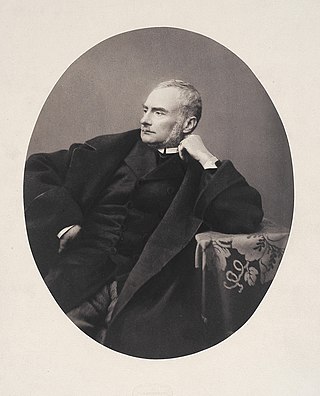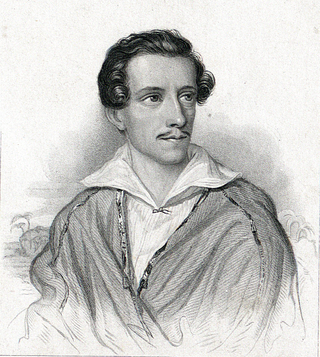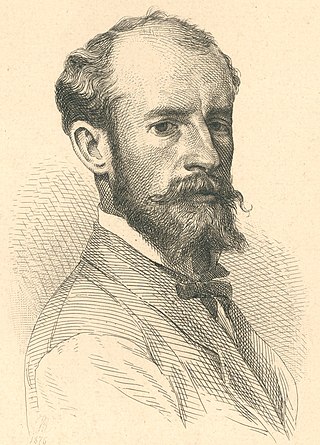
Adam Bernard Mickiewicz was a Polish poet, dramatist, essayist, publicist, translator and political activist. He is regarded as national poet in Poland, Lithuania and Belarus. A principal figure in Polish Romanticism, he is one of Poland's "Three Bards" and is widely regarded as Poland's greatest poet. He is also considered one of the greatest Slavic and European poets and has been dubbed a "Slavic bard". A leading Romantic dramatist, he has been compared in Poland and Europe to Byron and Goethe.

Jan Kochanowski was a Polish Renaissance poet who wrote in Latin and Polish and established poetic patterns that would become integral to Polish literary language. He has been called the greatest Polish poet before Adam Mickiewicz and one of the most influential Slavic poets prior to the 19th century.
Wzgórze Mickiewicza is one of the quarters of the city of Gdańsk, Poland. It was established on 5th October 1954 in the area of the village of Nowe Ujeścisko which was renamed to after the Polish poet Adam Mickiewicz. It is literally translated into English as "The Hillock of Mickiewicz".

The Adam Mickiewicz University is a research university in Poznań, Poland.

Napoleon Stanisław Adam Feliks Zygmunt Krasiński was a Polish poet traditionally ranked after Adam Mickiewicz and Juliusz Słowacki as one of Poland's Three Bards – the Romantic poets who influenced national consciousness in the period of Partitions of Poland.

Juliusz Słowacki was a Polish Romantic poet. He is considered one of the "Three Bards" of Polish literature — a major figure in the Polish Romantic period, and the father of modern Polish drama. His works often feature elements of Slavic pagan traditions, Polish history, mysticism and orientalism. His style includes the employment of neologisms and irony. His primary genre was the drama, but he also wrote lyric poetry. His most popular works include the dramas Kordian and Balladyna and the poems Beniowski, Testament mój and Anhelli.

Pan Twardowski, also known as Master Twardowski, is a sorcerer in Polish folklore and literature who made a deal with the Devil. Twardowski sold his soul in exchange for special powers – such as being able to summon for King Sigismund Augustus the spirit of his deceased wife – and eventually met a tragic fate.

The Three Bards are the national poets of Polish Romantic literature. The term is almost exclusively used to denote Adam Mickiewicz (1798–1855), Juliusz Słowacki (1809–1849) and Zygmunt Krasiński (1812–1859). Of the three, Mickiewicz is considered the most influential and Krasiński the least.
Polish poetry has a centuries-old history, similar to the Polish literature.
Adam Mickiewicz Monument may refer to:

Celina Szymanowska was a daughter of the Polish composer and pianist Maria Agata Szymanowska and the wife of the Polish Romantic poet Adam Mickiewicz.

The Adam Mickiewicz Institute is a government-sponsored organization funded by Poland's Ministry of Culture and National Heritage, and headquartered at 25 Mokotowska Street in Warsaw.

Teodor Rygier was a Polish sculptor known especially for his Adam Mickiewicz Monument (1898) in Kraków, Poland. He was selected in the major competition by popular demand.

Adam Mickiewicz Museum is a historic house museum dedicated to the life of Adam Mickiewicz, renowned Polish poet. It is located in the district of Beyoğlu, on the European side of Istanbul, Turkey.

The architecture of Poland includes modern and historical monuments of architectural and historical importance.

The Adam Mickiewicz Museum of Literature is a museum named for noted Polish poet and essayist Adam Mickiewicz in Warsaw, Poland. It was established in 1950.

Antoni Popiel was a Polish sculptor.

The Mickiewicz Square is one of the main squares in the city of Lviv, Ukraine.

The Adam Mickiewicz Monument, also known as the Adam Mickiewicz Column,, is a Neo-classical column commemorating the Polish Romantic poet Adam Mickiewicz (1798–1855) located at the Mickiewicz Square in the centre of Lviv, Ukraine, and opened in 1904.

The Undivine Comedy or The Un-divine Comedy, is a play written by Polish Romantic poet Zygmunt Krasiński in 1833, published anonymously in 1835. Its main theme is sociopolitical conflict – in Krasiński's words, "[between] aristocracy and democracy". It is Krasiński's best-known work and is regarded as one of the most important works of Polish Romantic literature.